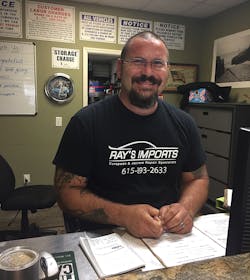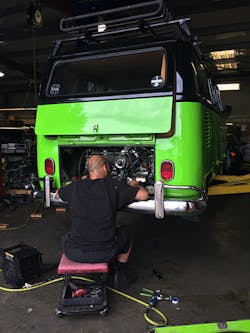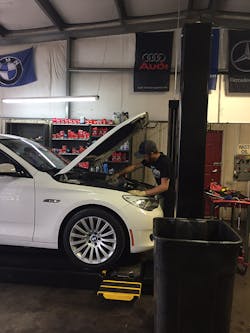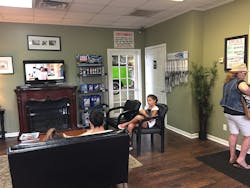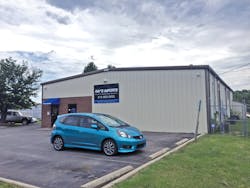
This article previously appeared in the Automotive Report, www.automotivereport.net
People engage in enterprise for a variety of reasons—mainly to make a living—but it is all the more special when you put passion into the mix. Of course nearly all repair shops are started by someone with an interest in cars, like Ray’s Imports in Murfreesboro, TN. However current owner George Russell was weaned on one iconic brand in particular.
“My father was a Volkswagen tech and I fell in love with them as a little kid,” he proudly states. “I was born and raised in Southern California and grew up in the heyday of Volkswagens.” He would follow in his father’s footsteps, becoming a VW technician in his own right.
|
At a Glance: Ray's Imports |
|
George Russell Owner |
|
Murfreesboro, Tenn. Location |
|
1 No. of shops |
|
47 Years in business |
|
3 No. of technicians |
|
8 Total no. of employees |
|
3 No. of bays per shop |
|
4,000 Square footage of shop |
But as Russell got older his appreciation expanded to other German makes after--as he puts it--“BMW stepped up their pace.” He was perfectly placed to observe the evolution from carburetion to fuel injection; working with older technicians, he was able to follow their learning curve into the new technology and consequently “opened my mind and my toolbox to a much broader spectrum of European cars.”
Then came the siren song of the Volunteer State. “My brother-in-law was being relocated from Torrance, CA to Central Tennessee,” Russell explains. “And the differences in education and quality of living caused me and my wife to want to move here too.”
And as a European specialist, there was no shortage of jobs in the Nashville-Murfreesboro area for the West Coast transplant. Yet Russell had worked his way through a few shops before he found that Ray’s Imports shared his values, particularly honesty and integrity.
“The more information I can give (a customer) that they can understand, the better off our relationship’s going to be in the long run,” explains Russell. “And Phillip Ray had the same thoughts I have, the same demeanor; he had no problem sitting down and explaining things to a customer, giving them a solid understanding of what he was doing and why.””
Started in 1973 as Ray’s Volkswagen Repair, in 1994 Ray retired and sold the shop. And while Russell didn’t buy the company directly from Ray in 2009, he would still occasionally see the shop’s namesake as a customer. “He used to bring me his cars when he was too up in age to do the repairs,” recalls Russell, who didn’t see any point in changing the shop’s name.
“The whole community knows Ray’s, and I felt it would be arrogant to change it to my name, considering it had been around for so long.” But despite his karmic connection with the original owner, Russell’s lack of managerial background would prove more challenging than he had anticipated.
Giving a long, wistful sigh, he recalls that first day of proprietorship: “I asked the old man who I had bought the shop from, ‘how did you run this place?’ He looked at me and said, ‘by the seat of my pants.’ And he turned around and walked away. That was all the education I got.
“I came into it just as ignorant as every other technician,” Russell laughs. “I had a basic understanding of business, but I didn’t understand that I would no longer be turning wrenches like I used to. Most technicians are quirky; they have a love for mechanical things and not so much for people. But being an owner worked for me because I found I enjoy people as much as I enjoy metal.
“There are a lot of personalities involved,” he continues, “but I feel like I’ve given something of a dream job to most technicians because I don’t stand over them and micro-manage; I allow them to be technicians. You have to be able to communicate--if you communicate with your customers and technicians, keeping everybody in the loop, you’ll do alright.”
While managing people was a steep learning curve, “I have to say the key thing I figured out that first year was Flat. Rate. Only,” Russell emphasizes. “Our repair shop does not work unless we are flat rate. Any shop that isn’t will go down steadily because they will spend more time chasing their tails after technicians standing around rather than producing. I’ve tried it. It does not work.”
Besides the occasional classes and seminars on the ever-evolving state of automotive technology, Russell does a great deal of research on the internet. “I stay up on it because I love the way cars are going,” he states. “Quite frankly you can look online and just about find what you need to know for free.”
Of course Russell also utilizes systems like AllData, Identifix and Mitchell for repair data. “You’ll get bits and pieces from all of them and sometimes you can get a little better picture,” he explains. “But if they don’t have all the information, that’s where you reference the Web to get the fundamentals on how a system works—it’s out there, you just have to dig for it. Some people are intimidated by it; I embrace it.
“The first step is to study how a circuit functions, what its primary purpose is,” Russell outlines. “Say you’re looking at the crankcase vent on a BMW; if you understand what system they’re utilizing then you can pull that information straight from Wikipedia. There’s so much raw (data online) these days, if you know what a component is, all you have to do is literally look it up and you can almost diagnose issues in cars.”
Russell also keeps up with industry trends, like the shop’s tasteful waiting area. “My wife has the eye for decoration,” he notes, “but my thought from day one was that the old grease monkey image was gone. If customers feel like they’re sitting in a nice living room versus a repair shop, they’re more likely to come back and not mind waiting a half hour to an hour if they’re just getting simple service.”
And yet there’s nothing simple about Russell’s service. “I advertise that I’m the home of the low-price European oil change,” he maintains. “You can’t use domestic oil in a European car. When it comes down to it, Liqui-Moly is the standard to go by. So I’ve made several deals; one with a local company for European-grade oil, another with Liqui-Moly to kind of become a local distributor for factory European services.”
To educate people about these services, Russell again turns to the internet. “I’m quick to put that information out there online,” he reports. “Facebook and Instagram are the advertising sources these days. My wife Marisa runs the entire advertising/web presence, designing and building the ads— frankly half the time she’s the brains behind the operation,” he laughs.
“So between me in the shop and the marketing my wife does online, we’re constantly putting information out. Right now we have follow-up services with Mitchell and Service Intelligence, and we’re looking into possibly starting rewards programs to keep our customers returning, because ultimately I don’t want to see them just for breakdowns; I want to see them for our services and prevent those breakdowns.”
Even so, all this focus on European cars doesn’t exclude Asian and domestic makes. “I always say just because a guy’s got a BMW doesn’t mean I’m going to turn away his Chevy truck,” Russell says. “Most of my guys have all worked on domestics. And classic cars have been my personal passion from day one, so I’m just as likely to restore a ’68 Camaro as an old air-cooled Volkswagen.”
About the Author
Robert Bravender
Robert Bravender graduated from the University of Memphis (TN) with a bachelor's degree in film and video production. Now working at Masters TV, he produces Motorhead Garage with longtime how-to guys Sam Memmolo and Dave Bowman. Bravender has edited a magazine for the National Muscle Car Association, a member-based race organization, which in turn lead to producing TV shows for ESPN, the Outdoor Life Network and Speedvision. He has produced shows ranging from the Mothers Polish Car Show Series to sport compact racing to Street Rodder TV.
